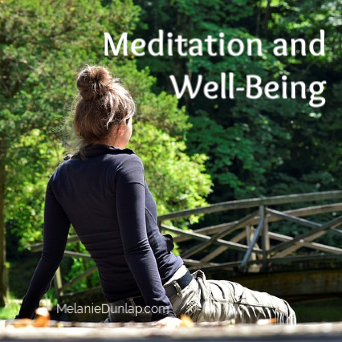The word meditation comes from the Latin word meditari which means “to concentrate”.
Meditation can help you achieve a deep state of relaxation and a calm mind. It is widely recognized as a mind-body complementary medicine.
During meditation, you focus your attention and try to eliminate thoughts that may be filling your mind and causing stress. Meditation can give you a sense of calm, peace and balance that benefits both your emotional well-being and your overall health.
Meditating is not the same as zoning out. It takes effort to maintain your concentration and to bring it back to the present moment when your mind wanders or you start to drift off. And it will. Everybody’s mind wanders.
But with regular practice, meditating actually changes the brain – it strengthens the areas associated with joy and relaxation and weakens those involved in negativity and stress.
Meditation and Well-being
When you meditate, you clear away the information overload that builds up every day and contributes to your stress.
Some emotional benefits of meditation can include:
- Gaining new perspective on a difficult situation
- Learning to manage your stress
- Increased self-awareness
- Better focus
- Reducing negative emotions
Meditation and Illness
Many healthy people use meditation to relax the body and reduce stress. But meditation is very useful if you have a medical condition, especially one that can be made worse by stress. It can even boost your immunity.
Scientific research is supporting the health benefits of meditation. Research suggests that meditation may help such conditions as:
- Anxiety
- Asthma
- Binge eating
- Cancer
- Depression
- Digestive issues
- Fatigue
- Heart disease
- High blood pressure
- Pain
- Sleep problems
- Substance abuse
How to Meditate
You’ve probably seen the perfect picture of meditation. A calm looking person sitting cross-legged on the floor, spine perfectly straight and hands held in delightful mudra poses.
Not everybody looks like that. If I try to sit in a cross-legged position to meditate, I will be screaming from a cramp in under three minutes! Some people like to sit, some like to lay down and some even like to walk.
The secret is to relax and let go. The more you hold on to an expectation of how meditation should be the less likely it is to be like that. You’ll get the best results when you don’t expect meditation to be a certain way. Just let whatever happens happen.
However you choose to meditate find a comfortable place where you will not be disturbed. Find a position that is comfortable for you, either in a chair or on the floor. Make sure that your spine is straight and well supported. Commit yourself to a specific amount of time and stick with it. I suggest 5 to 10 minutes to start, then gradually increasing your time.
General Guidelines:
- Close your eyes. This will allow you to concentrate easily.
- Pay attention to your breathing.
- Begin by just relaxing your muscles starting at the top of your head and moving all the way down to your feet. As you move to each area of your body breathe in noticing any areas of tension then just let go of any tension you notice as you breathe out.
- When other thoughts enter your head (and they will) simply imagine that you are pushing them away and return your attention to your breath.
Guided Meditation
Sometimes it is easier to quiet the mind by listening to someone else. A guided meditation is simply “meditation with the help of a guide”. You listen to your guide while they lead you through a series of relaxing visualizations.
Here is a guided meditation to help you find your light.
If you find that little voice in your head is making excuses for why you can’t meditate here are some comebacks….
Excuse List:
I don’t have an extra hour a day to just sit.
You don’t have to sit for an hour. You can if you want to, but it isn’t necessary. You can start with a regular practice of 5 minutes a day and increase your time as it fits your schedule. Sit in your car before going into an important meeting for a few minutes of quiet time, your meetings will be much more effective and productive.
I can’t sit cross- legged on the floor.
Not a problem. Meditation is not about how you sit or hold your hands or anything else that you do. Meditation isn’t about doing at all; it is simply about being. Sit at your desk, in front of an altar, in a busy airport or anywhere else you find yourself.
My mind simply will not stop. I can’t meditate because I cannot shut off my mind!
It is perfectly normal for your mind to be very active and busy with thoughts, plans and worries. All you have to do is gently bring your attention back to your breathing when you realize your mind has wandered off somewhere else. There’s no need to worry that you’re not doing the meditation properly- you are, drop all expectations of how your meditation session should be.
I feel sleepy when I try to meditate.
Sometimes during a meditation you’ll feel wide awake, alert, clear and focused. Sometimes you’ll be sleepy and drowsy. If you have no expectations about how it should be then you can relax and just let the meditation progress naturally. There’s no need to make any effort to change.
Now is a great time to start a meditation practice or get back to one. I would love to hear about your meditation practice in the comments below!
